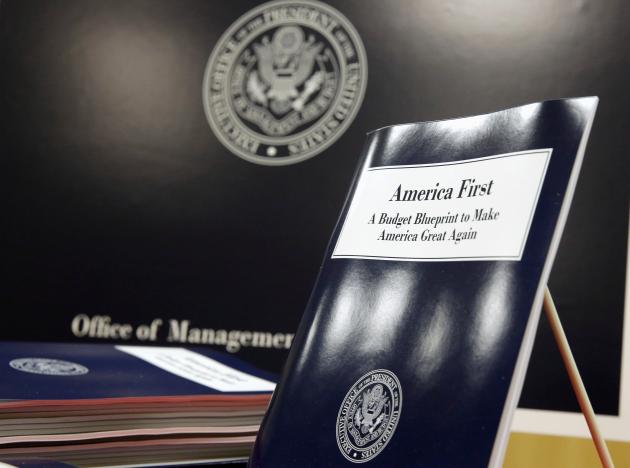Military wins in first Trump budget; environment, aid lose big
- Defiant U.S. prosecutor fired by Trump administration
- Trump's revised travel ban dealt first court setback
- Trump and Palestinian President Abbas to hold first talks
- Conservatives rebel against Trump-backed Republican healthcare plan
In a federal budget proposal with many losers, the Environmental Protection Agency and State Department stand out as targets for the biggest spending reductions. Funding would disappear altogether for 19 independent bodies that count on federal money for public broadcasting, the arts and regional issues from Alaska to Appalachia.
 |
| U.S. President Donald Trump's overview of the budget priorities for Fiscal Year 2018 are displayed at the U.S. Government Publishing Office (GPO) on its release by the Office of Management and Budget (OMB) in Washington, U.S. March 16, 2017. REUTERS/Joshua Roberts |
Trump's budget outline is a bare-bones plan covering just "discretionary" spending for the 2018 fiscal year starting on Oct. 1. It is the first volley in what is expected to be an intense battle over spending in coming months in Congress, which holds the federal purse strings and seldom approves presidents' budget plans.
Congress, controlled by Trump's fellow Republicans, may reject some or many of his proposed cuts. Some of the proposed changes, which Democrats will broadly oppose, have been targeted for decades by conservative Republicans.
In addition to the fiscal year 2018 request, a copy of a supplemental budget for fiscal year 2017 obtained by Reuters shows the administration plans to ask for $30 billion for the Department of Defense and $3 billion for the Department of Homeland Security.
The funds would be allocated this year to cover procurement of military technology such as F-35 fighter aircraft and drone systems, begin construction on the U.S.-Mexico border wall and increase detention space for migrants. Congress likely will consider the supplemental request by April 28, when the current regular funding expires.
Moderate Republicans already have expressed unease with potential cuts to popular domestic programs such as home-heating subsidies, clean-water projects and job training.

